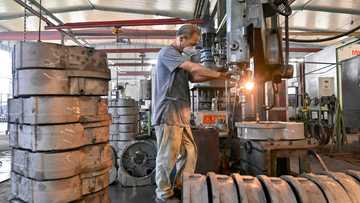EU plans 36% tariff on Chinese EVs, lower for Tesla

Source: AFP
The European Commission said Tuesday it plans to slap five-year import duties of up to 36 percent on Chinese electric cars, unless Beijing can offer an alternative solution to the damaging trade row over state subsidies.
It also said Tesla cars that are made in China would face a lower duty of nine percent.
Brussels last month slapped Chinese EVs with hefty provisional tariffs -- coming on top of current duties of 10 percent -- after an anti-subsidy probe found they were unfairly undermining European rivals.
On Tuesday the commission released a draft plan to make those tariffs definitive, subject to input from interested parties by end August, and to approval by EU member states by end October at the latest.
The definitive rates faced by major Chinese manufacturers would be 17 percent for market major BYD, tweaked downward from 17.4, 19.3 percent for Geely, down from 19.9, and 36.3 percent for SAIC, down from 37.6.
Other producers in China that cooperated with Brussels will face a tariff of 21.3 percent -- revised slightly upwards from 20.8 -- while those that did not would be subject to the maximum 36.3 percent duty.
US billionaire Elon Musk's Tesla -- which manufactures in China -- had asked Brussels for its own duty rate, set at nine percent, after the commission deemed that it benefited from fewer Chinese subsidies than domestic manufacturers.
Beijing vociferously opposes the EU tariffs, and has filed an appeal with the World Trade Organization -- of which Brussels has taken note while voicing confidence its measures are WTO-compatible.
"The EU is open to reach a solution that would be an alternative solution to the imposition of duties that would be effective and WTO compatible," a commission official told reporters.
"We consider that it's very much up to China to come up with alternatives," they said.
Concerning the provisional duties companies have faced since July 5, provided in the form of bank guarantees, the commission said it had determined it did not have legal grounds to collect the funds, which will be released once definitive measures take effect.
Balancing act
China and the EU have butted heads in recent years on a range of issues relating to trade, technology and national security.
The EU has launched a raft of probes targeting Chinese subsidies for solar panels, wind turbines and trains, while Beijing has begun its own investigations into imported European brandy and pork.
But Brussels faces a delicate balancing act as it tries to defend Europe's crucial auto industry and pivot towards green growth while also averting a showdown with Beijing.
China's emergence as an EV powerhouse stems in part from a targeted industrial strategy, with Beijing pouring vast state funds into domestic firms as well as research and development.
The approach has given Chinese firms a critical edge in the race to provide cheaper, more efficient EVs over leading European automakers, which have not always enjoyed such state largesse.
According to the Atlantic Council, Chinese sales of EVs abroad rose 70 percent in 2023, reaching $34.1 billion.
Almost 40 percent went to the European Union, the largest recipient of Chinese EVs.
PAY ATTENTION: Stay informed and follow us on Google News!
Source: AFP




